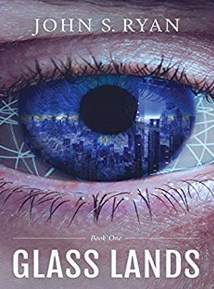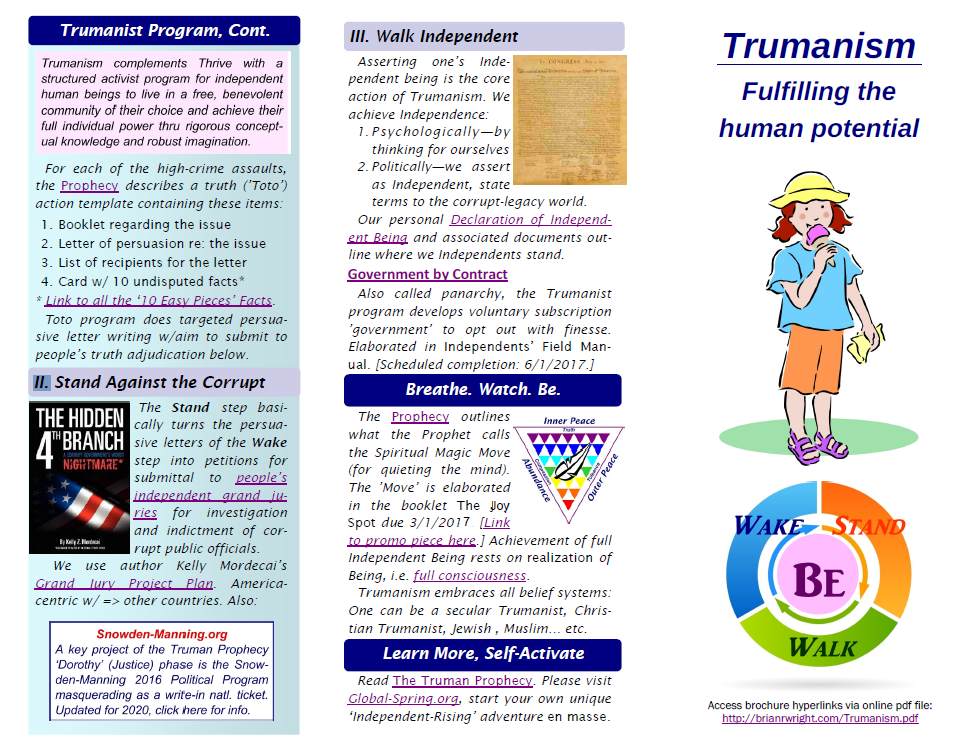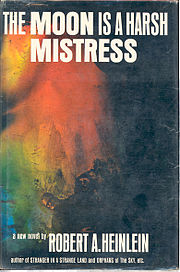By John S. Ryan
Reviewed by Brian R. Wright
Moon is a Harsh Mistress meets Time Enough for Love and then some
 Review first posted March 24, 2017.
Review first posted March 24, 2017.
First of all, I’m not the ideal candidate for reviewing such an amazing accomplishment as Glass Lands. Indeed, as I sit here having just climbed off the exhilarating 475-page Book 1 roller coaster ride from first-time novelist John Ryan, my mind is drawn into the Grand Editing era of the great Max Perkins at Scribners publishers of New York in the 1920s and 1930s.[1] Perkins was top banana not only because of cleaning up his celebrated authors’ prose, but because Perkins knew the whole field of serious fiction at the time. What Ryan’s book needs more than anything is a reviewer/editor of Perkins’ stature, working full time as such for a leading general fiction publisher or for an iconic science fiction magazine like Analog. Such an individual would have the depth of field to render a proper reading and comprehensive, positive account.
Alas, like Popeye, I only yam what I yam…which yam not a literary man of stature, so I confess to feeling a bit inadequate to the task of reviewing so auspicious a work as Glass Lands. Fortunately it takes no literary master critic to see what a groundbreaker we’re dealing with here. First, let me give you a sense of the story:
 For context, my recently coined political-moral philosophy of Trumanism (derived from my novel, The Truman Prophecy) holds that humankind stands at a major fork in the road: one branch is signified by the current and predominant global toxocracy run by the Men of the Power Sickness (MOPS), and the other by humanity waking up en masse to throw off this top-feeding parasitic, Old World Order class once and for all. Per my Prophecy, the good guys are going to prevail… resulting in a distributed-power, voluntary, benevolent, world- wide society based on the nonaggression principle and individual psychological independence: the Billion+ Points of Light Society… which will persist indefinitely.
For context, my recently coined political-moral philosophy of Trumanism (derived from my novel, The Truman Prophecy) holds that humankind stands at a major fork in the road: one branch is signified by the current and predominant global toxocracy run by the Men of the Power Sickness (MOPS), and the other by humanity waking up en masse to throw off this top-feeding parasitic, Old World Order class once and for all. Per my Prophecy, the good guys are going to prevail… resulting in a distributed-power, voluntary, benevolent, world- wide society based on the nonaggression principle and individual psychological independence: the Billion+ Points of Light Society… which will persist indefinitely.
Though perhaps optimistically inevitable, my BPL vision is rather boring for an imaginative sci fi author like Ryan. What Glass Lands presents is a nonspecific future Earth where humanity of today chose wrong, at least neglected to reign in the MOPS sufficiently to stamp them out. So a sect, the ‘World Union,’ of this global Mob of power psychopaths formed, unleashing some powerful subatomic technology to destroy people and nature. The World Union was resisted and ultimately overcome by ‘the Freelanders,’ by a risky sort of cyber jujitsu resulting in the current Earth setting where the novel takes place.
Problem is this Freeland earth, for a number of plot-relevant reasons, is descending into a replica of the World Union tyranny that the people overthrew decades ago. [No one should need to be hit over the head with its parallels to our own ‘Western Cabal’ global security state (betraying our beloved country’s roots in liberty) where a full-spectrum-dominance transnational, fascist-corporatist ‘Matrix’ aims to extinguish all vestiges of the individual.]
Enter the spectacular seminal event that launches young, special Gerald Goodstone—having an ancestry harking back to the brave souls who founded Freeland—on a quest to find his dear sister, while at the same time negotiate his growth into manhood and figure out what’s ‘not right’ with his world. Ryan’s mastery of the literary lingo is second to none. Illustrative fictional prose excerpt:
Brandy stood self-righteous as she pointed to the sunlit and familiar streets of Old New York. Her anger was palpable and since the recording was laced so heavily with olfactory vWare, city smells washed like a humid breeze over the viewers. The smell wasn’t good or bad. It smelled like a mix of savory foods, overflowing storm drains, and smoke from curb-side incinerators. The passengers began to talk excitedly and loudly to one another about the piratecast. Brandy being a hologram was not aware of the passengers, but the passion of her speech and gestures directed the viewers’ attention to hundreds of people milling around Freedom Square. They floated signs above their heads similar to the ones Gerald had seen all day in SLYcasted reports from other cities. The protests seemed more important and startling when seen against the backdrop of the four buildings that formed the Freedom Nation Capital. — p 67
Gerald’s journey, with his schoolmates AJ and Sally. then later, AJ’s parents and extended family living in a stark, high-tech-redneck-centric incarnation of the ‘Northern Michigan Wastelands.’ Picture a passel of Jed Clampetts, Jethro Bodines, Ellie Mayes, and (rejuve- nated) Grannys working alternatively as off-the-books, off-the-grid survivalist farmers/ rocket scientists/fighter pilots with strong, sinuous bodies and hearts of gold. These Uppa US folks provide a hefty share of the human grounding and motivational clues to the main plot, which is decisively carried out in wild and woolly cyborg (cybernetic organism) space!
The ‘sci’ world of this ‘sci fi’ novel is a tantalizing character of its own. Yet among the SLYscape, vWare, y-space, scribeospheres, m-spheres, RADcore, ROLIES, etc., not to mention the acronyms designating Freeland departments, you’ll be very confused if you don’t go with the flow and ‘feel’ what they mean through the context of the writing. [A brief glossary of terms would be a welcome addition to my mind.] My feeling is that the author deliberately kept the functional descriptions of entities and attributes of his cyborg space general, for good reason. Still, he integrates them well and plausibly; Glass Lands is no Alice in Wonderland ‘something is anything,’ touchy-feely abdication of the need to make sense. And once again, Ryan’s ‘sci’ descriptive prose is exemplary, e.g.:
The virtual universe of the SLYscape was suddenly all around him. He was immersed. Only he wasn’t cruising, he was driving like a vWare controller. Complex maneuvers and tricks were at his fingertips done with gestures and vWare blocks of code. He could create whole data spheres in moments just to better shape his m-sphere creation. From a programming chair like this one in the mine, he wasn’t restricted to the one-step thoughts he had to spoon-feed to the locust with his mind. People with moles [molecular control biological implants], he imagined, felt this way all the time. Their eyes going up and white as they skimmed the surface of SLYscape for intangible rewards like babblesphere coupons and perks. They could order tangible products that would arrive by drone in twenty minutes or materialize instantaneously in their FAC [Freeland Agricultural Center] providers. They could enjoy gossip that circulated and supported whatever it was they believed in. If they were fans of celebrities, they could request a sphere to experience what it was like to be that celebrity. It was called vReading and everyone did it. Except Gerald. He was not allowed the luxury of requesting vReading spheres from a molecular implant. He had to build them from scratch. — p 248
[Doesn’t the latter part of that excerpt make you think of our Facebook or social media?]
Ryan’s ability to project such a multifaceted believable 3D virtual/cyber world, while at the same time developing solidly real characters in ‘slow time’ on a finely textured word- canvas that sparkles with youthful energy casts him in the higher echelons of the genre. And that’s a tall order. Even though I’ve never been what one would call a sci fi junkie, I’ve read enough to know what’s right and good. And entertaining, for crying out loud!
 Ryan writes ‘young’ for readers who think young; the two works by Robert A. Heinlein that I cite in the subtitle of this review are emblematic of a) the struggle for liberty and b) the spiritual meaning of it all. In other words, classics. I look at Mr. Ryan as a young Heinlein cutting thru the more conventional, glorified BS of his day. [For example, most of us libertarian-(Ayn) Randian activists of the 1970s had a real problem with conventional sci fi giants like Isaac Asimov (Foundation series) or Frank Herbert (Dune) or even Arthur C. Clarke (2001: A Space Odyssey). For one thing any author positing monarchies to exist in a human future was suspect from the gitgo. And most popular writers of all types back then did not do enough, we felt, to slice through the subterfuge and extol the heroic individual over the soulless collective. Heinlein shone singularly to the liberty community of the day.]
Ryan writes ‘young’ for readers who think young; the two works by Robert A. Heinlein that I cite in the subtitle of this review are emblematic of a) the struggle for liberty and b) the spiritual meaning of it all. In other words, classics. I look at Mr. Ryan as a young Heinlein cutting thru the more conventional, glorified BS of his day. [For example, most of us libertarian-(Ayn) Randian activists of the 1970s had a real problem with conventional sci fi giants like Isaac Asimov (Foundation series) or Frank Herbert (Dune) or even Arthur C. Clarke (2001: A Space Odyssey). For one thing any author positing monarchies to exist in a human future was suspect from the gitgo. And most popular writers of all types back then did not do enough, we felt, to slice through the subterfuge and extol the heroic individual over the soulless collective. Heinlein shone singularly to the liberty community of the day.]
No, Ryan isn’t another Heinlein.[2] He has his own fresh, new voice. I wish I had time and the expertise to convey just how watershed and even culture-bearing a book Glass Lands can become; there are so many subtle fronts where he’s making an original mark. Ryan needs to be read widely by the Independents and millions more, especially to stimulate a Book 2… and 3.
Therein lies the major existential problem: the publishing world today is dominated by Amaglob (Amazon—book burner extraordinaire) and all the old publishing houses that you can’t break into without a note from the CIA. It’s like Hollywood. Truly groundbreaking works of towering achievement that challenge the consensus reality are squashed and diverted. [It’s a lot like the relapsing Freeland world Glass Lands‘ protagonists are trying to remedy—think of our own modern 24/7-surveillance imperial order, or, for a scary visual, watch the movie, Minority Report. Point is that Glass Lands needs to have an innovative marketing strategy to break thru the modern Barrier Cloud to independent consciousness.
We can do a lot by spreading the word via social media. But what really needs to happen is some renegade producer-director-writer in Hollywood, like a James Cameron (Titanic, Avatar), needs to get a summary—or read this review :)—of the book, then fashion it into a movie. Follow the Isaac Asimov approach with Foundation, make it a trilogy. I have to believe the author is thinking of two more books in the series. I’ll tell you what, it will take a writer with the vision of a Cameron to write the screenplay… or Ryan himself. It will be particularly challenging to bring into entertaining reality the cyber-action sequences.
And how are you going to be able to duplicate the 3D cyber-reality?
As for me, right now, I’m still curious to see what Book 2 holds in store. Book 1 takes us to a certain stasis between the Freeland empire and the Freeland liberty rebels, that must fall one way or the other. Naturally, as a Trumanist, I’d like to see the Glass Lands trilogy become a model for ‘Independents Rising,’ that is human beings of independent consciousness dismantling the Body Snatcher Horror Show of global collectivism we now seem to be stuck with, and moving forward to the Billion+ Points of Light society… of my dreams, anyway.
Let’s all turn Glass Lands into a self-fulfilling masterpiece!
[1] “The talents Maxwell Perkins nurtured were known worldwide: F. Scott Fitzgerald, Ernest Hemingway, Thomas Wolfe among many others [e.g. Ring Lardner, Edmund Wilson, Will James, Erskine Caldwell, Marjorie Rawlings, Sherwood Anderson, who became accomplished writers, if not household names]. But the man himself remained a mystery, a backstage presence who served these authors not only as editor but as critic, career manager, moneylender, psychoanalyst, confessor, and friend.”
[2] By the way, I did have one substantial issue with Heinlein, though not so much when I first read him. His militarism; he had a strong military background, Annapolis, I believe. Anyway, he seemed to fall into line a little too much with the real-time US warmaking machinery in his thinking, or at least seldom seemed to protest much.
This post has been read 1689 times!

